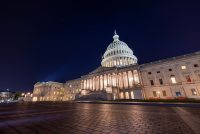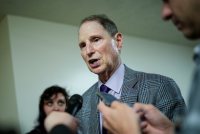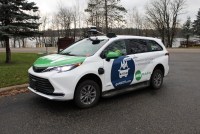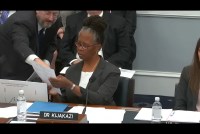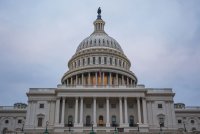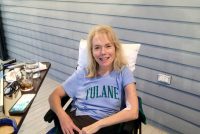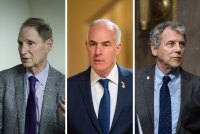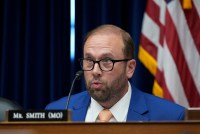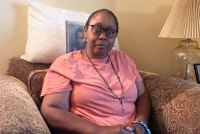Latest KFF Health News Stories
‘I Am Just Waiting to Die’: Social Security Clawbacks Drive Some Into Homelessness
The Social Security Administration is reclaiming billions of dollars in alleged overpayments from some of the nation’s poorest and most vulnerable, leaving some people homeless or struggling to stay in housing, beneficiaries and advocates say.
Social Security Chief Apologizes to Congress for Misleading Testimony on Overpayments
Acting Commissioner Kilolo Kijakazi sent the letter days after KFF Health News and Cox Media Group reported that the agency has been demanding money back from more than twice as many people as she’d disclosed in October testimony.
‘Until It Is Fixed’: Congress Ramps Up Action on Social Security Clawbacks
Sen. Ron Wyden (D-Ore.), chair of the Senate Finance Committee, vowed to meet monthly with Social Security officials until the problems surrounding overpayment demands are fixed.
People With Disabilities Hope Autonomous Vehicles Deliver Independence
A pilot project in northern Minnesota aims to pave the way for fully autonomous vehicles to offer independence for people who can’t drive.
Social Security Clawbacks Hit a Million More People Than Agency Chief Told Congress
More than 2 million people a year have been sent notices that Social Security overpaid them and demanding they repay the money. That’s twice as many as the head of Social Security disclosed at a congressional hearing in October.
In Congress, Calls Mount for Social Security to Address Clawbacks
In the wake of a KFF Health News-Cox Media Group investigation, U.S. lawmakers are asking what Social Security will do about its demands on their constituents to repay money already distributed — and sometimes in error. Sen. Rick Scott called the agency’s actions “unacceptable.”
Medicaid’s ‘Unwinding’ Can Be Especially Perilous for Disabled People
Earlier this year, Beverly Likens thought she’d done everything she needed to do to keep her Medicaid. Then came an unwelcome surprise: Ahead of surgery to treat chronic bleeding, the hospital said her insurance was inactive, jeopardizing her procedure. Likens had just been diagnosed with severe anemia and given a blood transfusion at the emergency room. “I […]
Coping with disability — and the cost of coping with disability — is an enormously important issue for older adults. Nora Super, an expert on aging, shares her personal story.
New Social Security Report Shows Growing Overpayment Problem Tops $23B
Social Security has been overpaying recipients for years, then demanding the money back, leaving people with bills for up to tens of thousands of dollars or more.
Biden Pick to Lead Social Security Pledges Action on ‘Heartbreaking’ Clawbacks
At a Senate confirmation hearing, former Maryland Gov. Martin O’Malley said he would address hardships the Social Security agency has caused by demanding money back from beneficiaries.
Senators Demand Answers From Social Security on Clawbacks Tied to Covid Relief
Covid relief payments weren’t supposed to cost people their Social Security benefits, but some recipients say they did. Senators want to know why.
Under Fire, Social Security Chief Vows ‘Top-to-Bottom’ Review of Payment Clawbacks
Acting Commissioner Kilolo Kijakazi was pressed by a House Ways and Means subcommittee to explain why so many poor, disabled, or retired people are suddenly hit with demands that can reach tens of thousands of dollars or more.
Covid Relief Payments Triggered Feds to Demand Money Back From Social Security Recipients
Some Social Security beneficiaries say the government is clawing back benefits after they received covid stimulus payments that were supposed to be exempt from asset limits.
Medicare Enrollees Can Switch Coverage Now. Here’s What’s New and What to Consider.
Fall is the time when enrollees in the federal program for older people and people with certain disabilities can make changes to their health and drug plans. The decision can be complicated, but here are some key points to keep in mind.
Es el momento de revisar el plan de Medicare. Lo nuevo que hay que saber
Desde el 15 de octubre y hasta el 7 de diciembre, los afiliados al programa tradicional o a los planes de Medicare Advantage, que ofrecen aseguradoras privadas, pueden cambiar su cobertura.
House Panel to Hold Hearing on Erroneous Social Security Payments
Congress is beginning to take action on the Social Security Administration’s clawbacks of payments it mistakenly made to poor, retired, and disabled Americans.
Social Security Chief Orders Broad Review of Benefit Overpayments
In the wake of an investigation by KFF Health News and Cox Media Group, the SSA acting commissioner said a special team will review “overpayment policies and procedures” and report directly back to her.
Social Security Overpayments Draw Scrutiny and Outrage From Members of Congress
Lawmakers are faulting the Social Security Administration for issuing billions of dollars of payments that beneficiaries weren’t entitled to receive — and then demanding the money back — in the wake of an investigation by KFF Health News and Cox Media Group.
Readers Rail at Social Security Overpayments and Insurers’ Prior Authorizations
KFF Health News gives readers a chance to comment on a recent batch of stories.
Social Security Overpays Billions to People, Many on Disability. Then It Demands the Money Back.
Beneficiaries in five states described what happened when they received letters calling on them to return overpayments that can reach tens of thousands of dollars or more.




